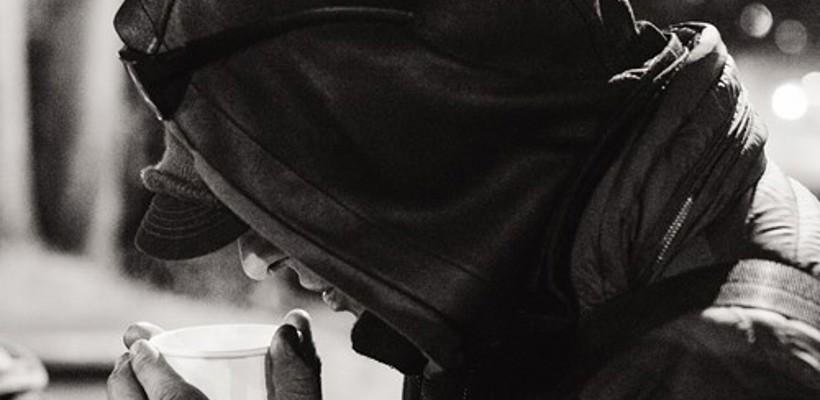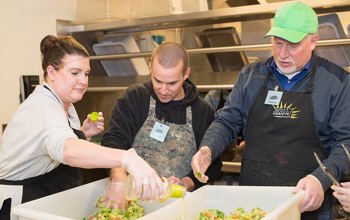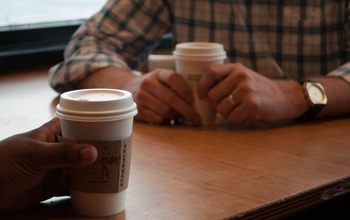When someone you love is addicted
Scott Cleveland, Men’s Recovery Program Director - May 21 2018
Do you know someone fighting addiction and needing recovery?
More Americans struggle with addiction and substance abuse than heart conditions, diabetes, or cancer combined. There’s a good chance someone you know and love is wrestling with an addiction of some kind.
Watching a friend, family member, or loved one struggle can be incredibly difficult, but there is hope! Recovery, restoration, and healing is possible.
Read on to learn about addiction and how you can help.
How do I know if someone I love is struggling with an addiction? Are there any warning signs?
It depends what substance they are abusing. Different substances affect individuals in various ways, both mentally and physically. But the following warning signs are most common, regardless of what someone might be addicted to:
- Neglecting obligations
- Lying or being secretive
- Loss of interest in hobbies, etc.
- Changes in attitude or mood swings
- Changes in sleep patterns
- Changes in weight or appearance
- Memory loss
- Stealing
If my loved one knows that drugs and alcohol are leading them down a harmful path, why don’t they just stop using?
People who experiment with drugs and alcohol are not thinking they are going to destroy their lives. Often folks use to self-medicate to numb unwanted thoughts, feelings, behavior, or memory, or to deal with physical pain. Many think they can easily stop using at any time until they realize they are losing control over how much or when they use.
They come to find that the substances have more of a stronghold then they ever thought possible, making it difficult to stop using on their own. Part of this is because drugs and alcohol over a period of time actually change the chemistry of the brain and create a neurobiological dependency on the substance sometimes requiring medical detox to safely break free.
The good news is that no one is beyond help or too far gone as long as they still have a heartbeat! The best type of treatment will often involve learning to live and cope without drugs and alcohol by addressing the root causes or factors leading up to it. This can take quite a bit of time – often about a year to change the frontal cortex of the brain – impacted by the substance – and develop healthy patterns of thinking, managing pain, and relating.
Can an intervention be helpful?
Yes, depending on how it is done, a family intervention can be beneficial and productive. You might consider a full family intervention to encourage a loved one struggling with addiction to get help and express how much you care for them. The more people engaged in the process, the more likely the intervention will be successful.
If you are proceeding with a family intervention:
1) Have someone outside the family facilitate the intervention
2) Get the family on the same page
3) Write out what you want to communicate
4) Don’t back down from the agreement
5) Have resources available (i.e. detoxification, outpatient or in-patient treatment.)
Ultimately, it is important to remember that it is the addicted person's choice to want change – we cannot force someone into treatment and recovery.
Is detox different than treatment or recovery?
Detox is a process to remove unwanted substances a user’s body so that they may begin a sober recovery. For example, going through a detox program would be necessary if a person is using alcohol or benzodiazepine because of how these specific drugs work in the body. Even for those who are using drugs that don’t require medical detox, many will choose to detox in a formal setting to manage the discomfort associated with the withdrawals.
Treatment is defined as all help offered during the recovery process. It often follows detox. Through treatment and recovery, there is a more in-depth approach of getting to the root of why an addicted person uses, providing them with tools to walk in sobriety. Treatment or recovery is focused on helping the addicted person learn how to live life without needing drugs or alcohol.
How can I set boundaries and not enable a loved one struggling with addiction?
Wanting to support and help someone struggling with addiction is a natural tendency, but can quickly turn into enabling or rescuing – without healthy boundaries in place. In one sense, enabling has the same meaning as empowering. It means lending a hand to help people accomplish things they could not do by themselves.
More recently, however, enabling has developed the specialized meaning of offering help that perpetuates rather than solves a problem. A parent who allows a child to stay home from school because he hasn’t studied for a test is enabling irresponsibility. The spouse who makes excuses for his hung-over partner is enabling alcohol abuse. The friend who lends money to a drug addict “so he won’t be forced to steal” is enabling that addiction.
Those who habitually enable dysfunctional behavior are often referred to as co-dependent. It’s a telling word, because an enabler’s self-esteem is often dependent on his or her ability and willingness to “help” in inappropriate ways. This “help” allows the enabler to feel in control of an unmanageable situation.
According to Melody Beattie, a therapist with alcoholics and drug addicts, people who are codependent often act as rescuers by sacrificing themselves for others. They rush to help, brushing aside their own needs, emotions, and wishes. The reality, though, is that enabling not only doesn’t help, but it actively causes harm and makes the situation worse.
It is important to set boundaries around areas that you see to be causing further issues or are not acceptable. This may be hard to do at first, but “tough love” is just what that the individual stuck in their addictive and harmful patterns need.
Are there other ways I can help?
Taking care of yourself is one of the best ways you can in turn help someone else.
Support from others who can relate – as well as self-care – are both key ingredients when in a position of trying to support a loved one struggling with addiction. It is not uncommon to become weary and feel discouraged without the proper tools to processes feelings, emotions, and the situation at hand. You are not alone in this journey. There are many, many other individuals who have similar stories and understand much of what you are going through.
Attending Al-Anon meetings, connecting with support groups, or reaching out to someone who has gone through similar experiences are all great resources to gain healthy support and direction.
If you are located in the King County area, there are many different Al-Anon meetings to choose from.
It is also important to educate yourself on addiction and the impact it has not only on the addicted person, but also family and friends. By knowing more, you will be better equipped. A few books that are beneficial in understanding more are:
- Drug Addiction and Family - by Marina Barnard
- Why Don’t They Just Quit - by Joel Herzanek and Judy Herzanek
- Beyond Addiction - by Jeffrey Foote and Carrie Wilkens
- Beautiful Boy: A Father’s Journey Through His Son’s Addiction - by David Sheff
- Codependent No More - by Melody Beattie
The most important thing you can do in all of this is pray...and keep praying.
Prayer will be your most powerful tool, but it doesn’t just stop there! Places such as the Mission are here to provide resources and programs focused on recovery for your loved one struggling with an addiction.







